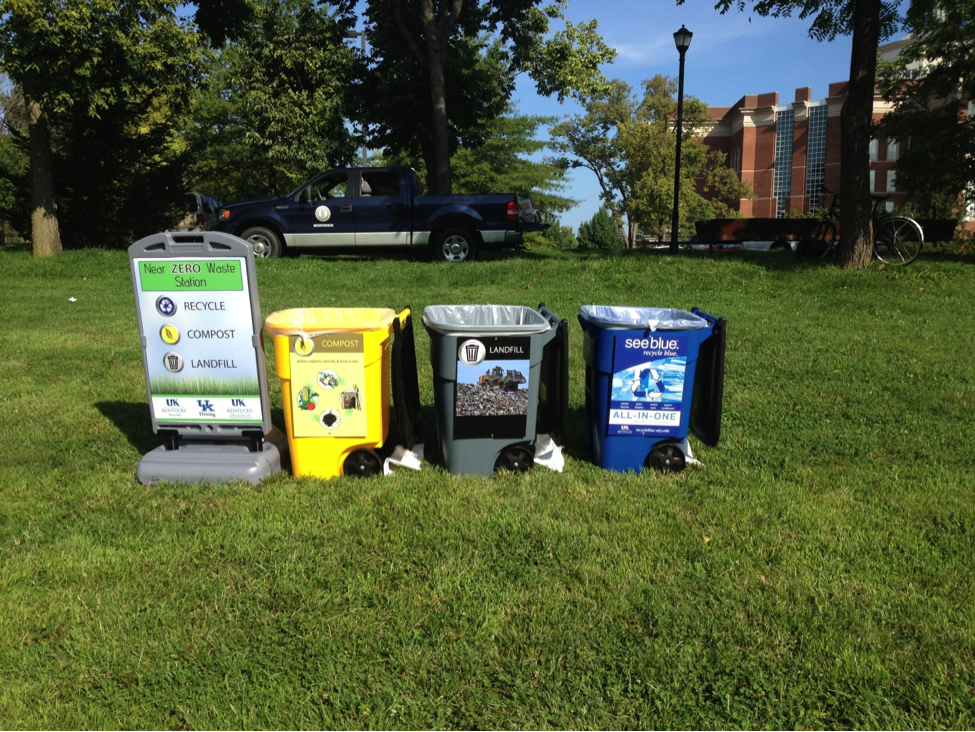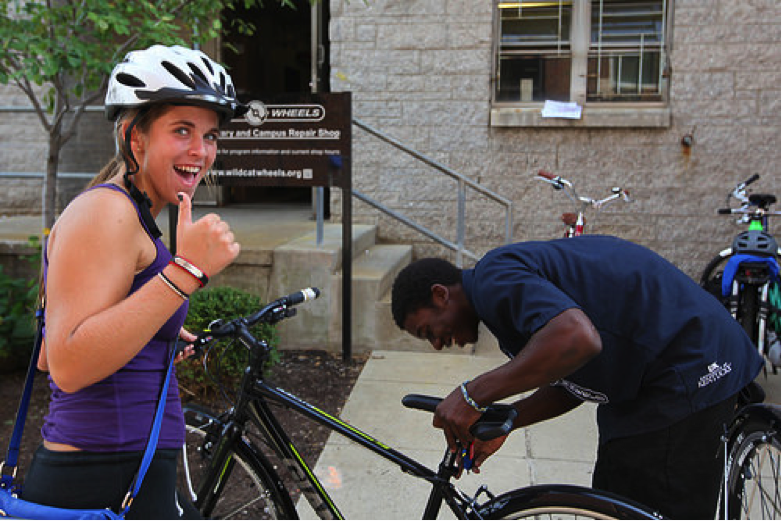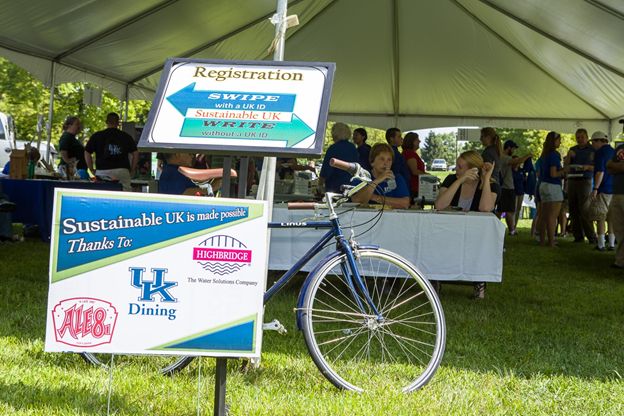Shane Tedder, the University of Kentucky’s Sustainability Coordinator in the Office of Sustainability, recently spoke to a group of students in Greenhouse’s A&S 100 course, Pathways and Barriers to Environmental Sustainability. Shane talked about what UK is doing to become more sustainable and how each of us, and particularly students, can become more involved in the process of making UK more sustainable. I love the word process. Processes involve steps or actions undertaken to reach a desired goal or endpoint. And as Shane pointed out, sustainability is a process of continuous improvement – an effort to enhance the positives and reduce the negatives.
Listening to Shane’s talk, I noted five key concepts. Here are his take-home messages:
1.Regardless of your major, learning about sustainability is important.
 Ever heard of the Triple Bottom Line (TBL)? I bet most businesses, non-profit organizations, and government agencies have. The TBL is a way for organizations to account for their environmental, financial and social impacts on the world. Organizations focused on all three areas – environmental stewardship, economic vitality, and social well-being (e.g. planet, profit and people) – are striving for sustainability and thus long-term success.
Ever heard of the Triple Bottom Line (TBL)? I bet most businesses, non-profit organizations, and government agencies have. The TBL is a way for organizations to account for their environmental, financial and social impacts on the world. Organizations focused on all three areas – environmental stewardship, economic vitality, and social well-being (e.g. planet, profit and people) – are striving for sustainability and thus long-term success.
From large organizations such as Google, General Electric, Coca-Cola, Novus International, and the City of Austin, Texas, which have chief sustainability officers (yes, like chief financial officers only with a focus on sustainable practices) to smaller ones such as FoodChain, sustainability is receiving more focus because it just makes sense.
So whether your major is in the field of agriculture, engineering, health, or interior design, chances are you will need to understand sustainability when you enter the workforce.
2.UK has a number of groups tackling the issue of sustainability, and that number is growing.
What started out as one group in 1993 – the Center for Sustainable Cities – has now grown into multiple groups. Groups such as the President’s Sustainability Advisor Committee, Student Sustainability Council, Tracy Farmer Institute for Sustainability and the Environment, Environmental and Natural Resource Issues Task Force, and Office of Sustainability are all working on sustainability-related plans, practices, research, education and outreach efforts at UK. To learn more, visit each group’s website.
3.UK has a wealth of opportunities for students to get involved in sustainability related issues.
If you are a student who is interested in sustainability, UK is the place for you. In addition to Greenhouse, the Environment and Sustainability Residential College, UK has a number of student organizations involved in sustainability-related issues. Check out UK’s Office of Student Involvement to search for organizations involved in sustainability and the environment.
4.Our behaviors, no matter how small, have an impact.
 Shane calls recycling the gateway behavior to sustainability, and for good reason. I bet most of us learned about the three R’s starting in elementary school – Reduce, Reuse and Recycle. And with UK’s effort to increase the number of all-in-one recycling receptacles on campus, recycling has become quite easy. But there are other ways that UK is working to empower students to make more sustainable choices. Two immediate examples that come to mind are drinking water and biking on campus. UK is continuing to install more refillable water bottle stations around campus, making it easier to ditch plastic water bottles in favor of refillable ones. Wildcat Wheels is helping make transportation around campus more sustainable by offering students the chance to check out bikes for durations of one week to an entire semester.
Shane calls recycling the gateway behavior to sustainability, and for good reason. I bet most of us learned about the three R’s starting in elementary school – Reduce, Reuse and Recycle. And with UK’s effort to increase the number of all-in-one recycling receptacles on campus, recycling has become quite easy. But there are other ways that UK is working to empower students to make more sustainable choices. Two immediate examples that come to mind are drinking water and biking on campus. UK is continuing to install more refillable water bottle stations around campus, making it easier to ditch plastic water bottles in favor of refillable ones. Wildcat Wheels is helping make transportation around campus more sustainable by offering students the chance to check out bikes for durations of one week to an entire semester.
5.If you have an idea on how to improve sustainability at UK, share it.
Ideas can only be great if they are shared. If you have an idea, no matter how big or small, about how to improve sustainability at UK, let Shane Tedder (shane.tedder@uky.edu) know. Your green idea could make the campus better for everyone.
Remember, all of us – students, staff, faculty, administration, alumni and fans – can help to continually improve the process of sustainability at UK by enhancing the positives and reducing the negatives. So, get involved!
--Carmen Agouridis, Ph.D., P.E.
Biosystems and Agricultural Engineering


 Ever heard of the Triple Bottom Line (TBL)? I bet most businesses, non-profit organizations, and government agencies have. The TBL is a way for organizations to account for their environmental, financial and social impacts on the world. Organizations focused on all three areas – environmental stewardship, economic vitality, and social well-being (e.g. planet, profit and people) – are striving for sustainability and thus long-term success.
Ever heard of the Triple Bottom Line (TBL)? I bet most businesses, non-profit organizations, and government agencies have. The TBL is a way for organizations to account for their environmental, financial and social impacts on the world. Organizations focused on all three areas – environmental stewardship, economic vitality, and social well-being (e.g. planet, profit and people) – are striving for sustainability and thus long-term success. Shane calls recycling the gateway behavior to sustainability, and for good reason. I bet most of us learned about the three R’s starting in elementary school – Reduce, Reuse and Recycle. And with UK’s effort to increase the number of all-in-one recycling receptacles on campus, recycling has become quite easy. But there are other ways that UK is working to empower students to make more sustainable choices. Two immediate examples that come to mind are drinking water and biking on campus. UK is continuing to install more refillable water bottle stations around campus, making it easier to ditch plastic water bottles in favor of refillable ones.
Shane calls recycling the gateway behavior to sustainability, and for good reason. I bet most of us learned about the three R’s starting in elementary school – Reduce, Reuse and Recycle. And with UK’s effort to increase the number of all-in-one recycling receptacles on campus, recycling has become quite easy. But there are other ways that UK is working to empower students to make more sustainable choices. Two immediate examples that come to mind are drinking water and biking on campus. UK is continuing to install more refillable water bottle stations around campus, making it easier to ditch plastic water bottles in favor of refillable ones.